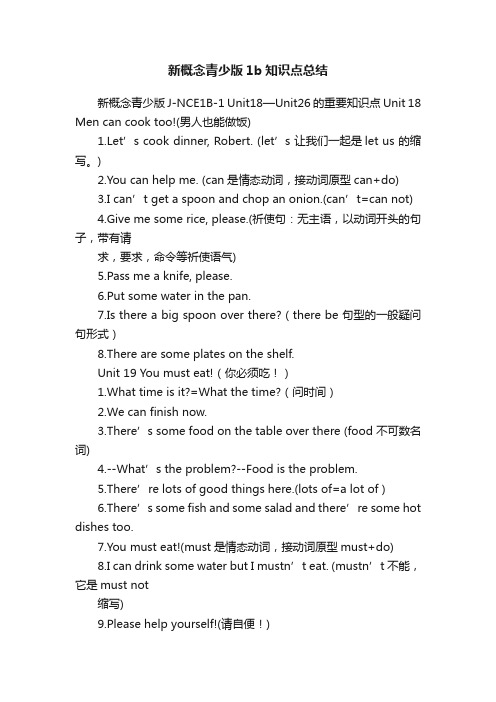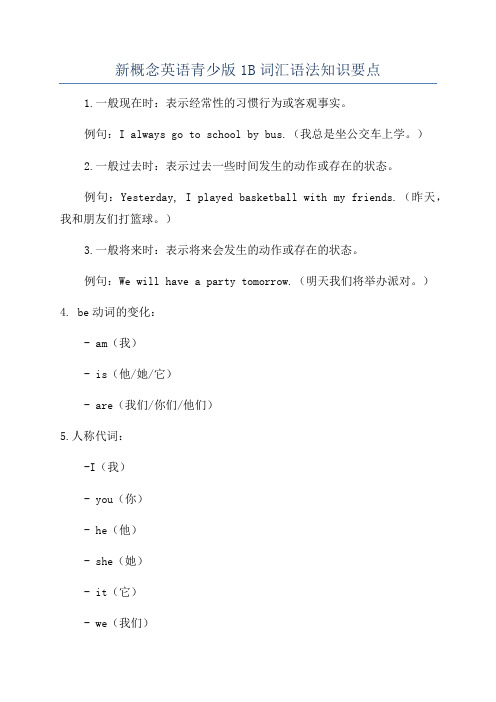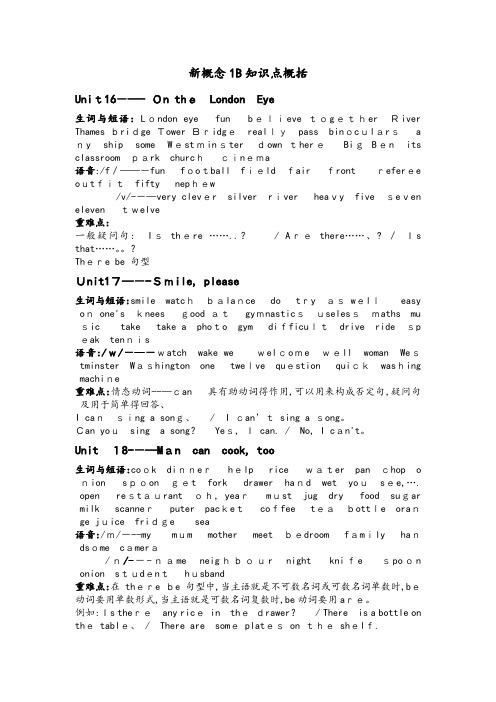新概念英语青少版1B-词汇语法知识要点
青少新概念1B知识点

青少新概念1BUnit 16词汇:四会词汇:fun 乐趣believe 相信together 一起bridge 桥梁really 真正地pass 递给any 任何一个ship 轮船some 一些Its 它的classroom 教室park 公园church 教堂cinema 电影院三会词汇:London Eye 伦敦眼River Thames 泰晤士河Tower Bridge 塔桥Westminster Bridge 威斯敏斯特桥binoculars 望远镜down there 下面那里Big Ben 大本钟句型:1.Are there any children in the...? ...有一些孩子吗?Yes, there are. No, there aren't. 是的,有。
不,没有。
2.Can you see any children in the...? 你能看见一些孩子在...? Yes, I can. No, I can't. 是的,我能。
不,我不能。
3. There are some people on the bridge. 桥上有一些人。
语法:There be 句型的复数部分日常情景会话:1.Isn't it great? 太棒了。
2.Can you believe it? 你能相信吗?Unit 17词汇:四会词汇:smile 微笑watch 看balance 保持平衡do 做try 尝试easy 简单的,容易的useless 差劲的,无能的music 音乐take 照相difficult 困难的gym 体育馆Maths 数学drive 开,驾驶ride 骑speak 说tennis 网球三会词汇:as well 也good at 擅长take a photo 照相gymnastics 体操句型:1. Can you do Maths?你会数学吗?Yes, I can, it’s easy. No, I can’t, it’s difficult. 是,我会, 很简单。
新概念青少版1b知识点总结

新概念青少版1b知识点总结新概念青少版J-NCE1B-1 Unit18—Unit26的重要知识点Unit 18 Men can cook too!(男人也能做饭)1.Let’s cook dinner, Robert. (let’s 让我们一起是let us 的缩写。
)2.You can help me. (can是情态动词,接动词原型can+do)3.I can’t get a spoon and chop an onion.(can’t=can not)4.Give me some rice, please.(祈使句:无主语,以动词开头的句子,带有请求,要求,命令等祈使语气)5.Pass me a knife, please.6.Put some water in the pan.7.Is there a big spoon over there?(there be 句型的一般疑问句形式)8.There are some plates on the shelf.Unit 19 You must eat!(你必须吃!)1.What time is it?=What the time?(问时间)2.We can finish now.3.There’s some food on the table over there (food 不可数名词)4.--What’s the problem?--Food is the problem.5.There’re lots of good things here.(lots of=a lot of )6.There’s some fish and some salad and there’re some hot dishes too.7.You must eat!(must是情态动词,接动词原型must+do)8.I can drink some water but I mustn’t eat. (mustn’t不能,它是must not缩写)9.Please help yourself!(请自便!)Unit 20 What a surprise!(好一个意外!)1.Nice to speak to you!(通话中常用)2.How are you? And how is Ken?(你好吗?……好吗?问候语)3.I’m very busy. (be busy with sth.如:他正忙于他的家庭作业:He is busywith his homework.)4.Your music lesson is at half past six and it’s a quarter to six now.(at+时间在几点;past 过,half past six 6点半;to 未到,差 a quarter to six 6点差一刻/ 5:45)5.I can’t find my music book.6.I must find my book.7.What a surprise!(感叹句)8.Can we go now?Unit 21 Breakfast Blues(早餐忧郁)1.Do you want any breakfast, Paul?(你想要……)2.I mustn’t train on an empty stomach.3.Have we got any orange juice?(我们有……吗?)4.How much juice do you want?(问数量多少how much+不可数名词;howmany+可数名词)5.There is some juice in the fridge. (juice不可数名词)6.I‘ve got some yoghurt in the fridge.(我有……)7.The food there is terrible.(糟糕的)Unit 22 Watching the neighbors观察邻居们1.She is very shy.(害羞)2. She hasn’t got many friends (没有……)3.There are lots of nice girls in the art college.4.She is happy with Paul.5.He is a very lovely young man.6. He can introduce her to them.7. They are both busy with their studies.Unit 23 An expensive camera一架昂贵的照相机1.What kind of camera has Claire got?(问种类)2.Let me think.3.I can’t remember the name. (remember--forget)4.It’s a very expensive camera. (expensive--cheap)5.Claire wants another one.(另一)6.Claire wants a new one for her birthday.(为了)7.She can give me the old one at any time.Unit 24 A light dinner 一顿清淡的晚餐1.Do you like fish?(你喜欢…?)2.I really like salmon.3.Do you like vegetables?4.There is some lettuce and some cucumber.5.That’s fantastic!6.It’s my favorite kind of food.7.You and Paul can pick some strawberries from the garden. Unit 25 The weekend shopping周末购物1.There isn’t any sugar in the house.2.I must go to the supermarket.3.Let’s make a shopping list.4.How much sugar do we need?5.There isn’t much tea in tin.6.What about food for the weekend?7.These things are all really boring. (boring--interesting) Unit26 A self-service restaurant1.What’s on the menu?2.Show me the menu, please.3.Help yourself!4.That’s vegetable soup, isn’t it?(反意疑问句)5.That’s right.6.Pass me a bowl of soup, please.7.Give me one of those, please. (one of …其中之一)。
新概念青少版1b重要概念归纳

新概念青少版1b重要概念归纳
本文档对新概念青少版1b教材中的重要概念进行归纳总结。
1. 被动语态
被动语态是句子中的一种语法结构,用于强调动作的承受者而不是执行者。
在被动语态中,主语是动作的承受者,而动作的执行者通常被省略或者用by短语表示。
2. 直接引语和间接引语
直接引语是将别人的原话直接用引号括起来的句子。
而间接引语是通过转述别人的原话而不是直接引用的句子。
3. 形容词的比较级
形容词的比较级用于表示两个事物之间的比较。
一般情况下,在形容词的前面加上more或者-er来构成比较级。
4. 复合词
复合词是由两个或更多个词构成的一个新词。
这种构成方式可
以通过连字符连接每个词,或者直接将它们组合在一起。
5. 虚拟语气
虚拟语气用于表示不实际的情况、愿望、建议或者假设。
在虚
拟语气中,动词的形式可能会发生变化,如使用were代替was等。
6. 动词的时态
动词的时态用于表示动作发生的时间。
英语中常见的时态包括
一般现在时、一般过去时、一般将来时等。
以上是新概念青少版1b教材中的一些重要概念的简要归纳。
通过了解这些概念,学生们可以更好地理解和运用英语语法的基本
知识。
新概念英语青少版1B-词汇语法知识要点

Unit 16Words and Expressions:London Eye 伦敦眼fun 乐趣believe 相信together 一起River Thames 泰晤士河baidge 桥Tower Bridge 塔桥really 真正地pass 递给binoculars 望远镜any 任何一个some 一些Westminster Bridge 威斯敏斯特桥down there 下面那里Big Ben 大笨钟classroom 教室church 教堂cinema 电影院Grammar:some和any的用法。
some和any都可以修饰复数名词。
不同的是,some用在肯定句中,而any用在否定句和疑问句中。
Unit 17Words and Expressions:smile 微笑watch 看balance 保持平衡do 做try 尝试as well 也easy 简单的no one's knees 跪着good at 擅长gymnastics 体操useless 差劲的,无能的maths 数学music 音乐take a photo 照相gym 体育馆difficult 困难的drive 开,驾驶ride 骑speak 说tennis 网球Grammar:1. can的用法。
can是情态动词,不能在句中单独作谓语,必须和其他动词原形一起构成谓语。
情态动词没有人称和数的变化,也就是说,不管主语是第几人称,是单数还是复数,can都没有变化。
can既可以表示能力,也可以表示可能性。
口诀:肯定用can加原形,否定把can变can't,疑问can就往前提,原形留在主语后。
2. be good at和be useless at。
这两个词意思正好相反,分别表示“在某方面擅长”和“在某方面差劲”,at后可接名词或代词,表示擅长或差劲的方面。
Unit 18Words and Expressions:cook 做饭菜,烹调dinner 晚餐rice 大米pan 平底锅chop 切开onion 洋葱spoon 勺子fork 叉子drawer 抽屉wet 湿的You see,…你看,……restaurant 餐馆,饭店must 必须jug 罐子dry 干燥的sugar 糖食milk 牛奶scanner 扫描仪computer 电脑packet 小包coffee 咖啡tea 茶叶bottle 瓶子orange juice 橙汁fridge 冰箱sea 海Grammar:可数名词和不可数名词。
新概念英语青少版1B词汇语法知识要点

新概念英语青少版1B词汇语法知识要点1.一般现在时:表示经常性的习惯行为或客观事实。
例句:I always go to school by bus.(我总是坐公交车上学。
)2.一般过去时:表示过去一些时间发生的动作或存在的状态。
例句:Yesterday, I played basketball with my friends.(昨天,我和朋友们打篮球。
)3.一般将来时:表示将来会发生的动作或存在的状态。
例句:We will have a party tomorrow.(明天我们将举办派对。
)4. be动词的变化:- am(我)- is(他/她/它)- are(我们/你们/他们)5.人称代词:-I(我)- you(你)- he(他)- she(她)- it(它)- we(我们)- they(他们)6.形容词的比较级和最高级形式:用于比较两个或多个事物的大小或程度。
- 比较级:在形容词前面加上-er,如taller(更高的), faster (更快的)- 最高级:在形容词前面加上-est,如tallest(最高的),fastest(最快的)7.介词:用于表示关系、位置、方向等。
- in(在...内部)- on(在...上面)- under(在...下面)- behind(在...后面)- beside(在...旁边)8.物主代词:用于表示所属关系。
- my(我的)- your(你的)- his(他的)- her(她的)- its(它的)- your(你们的)- their(他们的)9.句子结构:主语+谓语+宾语(SVO)。
例句:My sister likes ice cream.(我的姐姐喜欢冰淇淋。
新概念青少版1b重点知识

新概念青少版1b重点知识
新概念青少版1B重点知识如下:
1. 词汇:重点掌握本课使用的词汇,包括单词的拼写、发音和词义等。
2. 语法:重点掌握本课所涉及的语法知识,如be动词的用法、there be句型和一般现在时的用法等。
3. 句型:重点掌握本课的重要句型,如肯定句、否定句、疑问句、陈述句和简单句等。
4. 阅读技巧:学会使用关键词、上下文推理和猜测词义等阅读技巧来理解文章的主旨和细节信息。
5. 表达能力:培养学生的口语表达和书写能力,能够流利地用英语进行简单的交流和书写。
6. 文化背景:了解一些与课文相关的文化背景知识,如西方文化习俗、英美国家的地理位置等。
以上是新概念青少版1B的重点知识,学生应该掌握并运用于
实际的学习中。
青少版新概念英语1A、1B词汇总结

meet________ family________ hello________ my________ name________is________ this________ wife________ daughter________ son________and________ nephew________ friend________ teacher________ your________ pen________ yes________ it________ no________ not________ whose________ it’s________ isn’t________ pencil________ hat________ coat________mobile________ ruler________ book________ bag________ what________Hey________ good________ look________ a________ wheel________green________ OK________ now________ flower________ red________ umbrella________ that________ grey________ bird________ key________right________ silver________ chair________ table________ bicycle________ colour________ what________white________ an________ black________dress________ camera________ blue________ desk________ brown________ who________ boy________ which________ on________ man________with________ Mr. ________ he________ father________ woman________she________ mother________ girl________ sister________look at________ young________ in ________old________ car________cousin________ so________ too________ brother________ their________ student________ his________ her________ new________ horse________yellow________ tell me about________ well________ how________ How are you? ________ I________ am________ fine________ but________ very________ sorry________ What’s the matter with? ________ him________ sure________hot________ hungry________ thirsty________ poor________What about? ________ doctor________ busy________ ill________perhaps________ are________ Better safe than sorry. ________ cold________or________ happy________ clever________ stupid________ sad________story________ funny________ silly________ neighbour________nice________ at________sports academy________What do you do? ________ job________art college________ come________ aunt________ writer________ our________ husband________ everybody________ her________Thank you! ________ for________ welcome________ gossip________housewife________photographer________ policeman________ postman________actor________ accountant________ where________over there________tall________ pretty________ from________ English________ American________ Washington________ here________ famous________ expensive________ beautiful________ handsome________ wait________ see________London________ nationality________ describe________ short________Chinese________ French________ fat________ thin________ actress________Mum________ one________ favourite________ long________ schoolbag________ give________ me________ please________Here you are.________ pencil-case________ thing________ Oh,well________ put________ No harm done. ________ case________Thanks.________ Dad________ small________ ball________ box________ big ________clean________ cup________dirty________ floor________ thick________ thin________ under________bed________ light________ plate________ heavy________ shelf________ cupboard________ bump________ night________wake up________ listen________ there________ noise________ living-room________ burglar________ Nonsense!________ kitchen________ torch________ Here it is. ________ house________Be careful.________ someone________ downstairs________ wide-awake________we________ all________ bedroom________ garden________ door________ secretary________ basket________ bowl________ apple________ orange________ near________ river________ tree________ pink________ cat________they________Here are …________ pyjamas________ them________ those________bright red________ a bit________ shirt________ pure white________washing machine________ lovely________ dog________ sock________ jump________hurry________ bus________ Wait a minute! ________ school________Mom________ Oh,dear! ________ empty________Come on! ________ full________ of course________ people________Never mind! ________London Eye伦敦眼fun [f?n] adj. 有趣的believe [bi'li:v] vt. 相信together [t?'ɡe??] adv. 一起River Thames [temz] n.泰晤士河bridge [brid?] n. 桥梁Tower Bridge n. 塔桥really ['ri?li] adv. 真正地binoculars [bai'n?kjul?z] n. 双筒望远镜pass [pɑ:s] vt. 递给any ['eni] 任何一个ship [?ip] n. 船Westminster Bridge ['westminst?] 威斯敏斯特大桥some [s?m] adj. 一些down there [daun] [?ε?] 在那儿Big Ben(伦敦英国议会大厦钟楼上的)大本钟its [its] pron. 它的classroom ['klɑ:srum] n. 教室park [pɑ:k] n. 公园church [t??:t?] n. 教堂cinema ['sin?m?] n. 电影院smile [smail] v. 微笑watch [w?t?] v. 看balance ['b?l?ns] v. 保持平衡do [du: ] v. 做try [trai] v. 尝试as well也easy ['i:zi] adj. 简单的,容易的on one’s knees 跪着good at 善于gymnastics [d?im'n?stiks] n. 体操useless ['ju:slis] adj. 差劲的,无能的Maths [m?θs] n. 数学Music ['mju:zik] n. 音乐take [teik] v. 照(相)take a photo拍照gym [d?im] n. 体育馆difficult ['difik?lt] adj. 困难的drive [draiv] v. 开,驾驶ride [raid] v. 骑speak [spi:k] v. 说tennis ['tenis] n. 网球cook [kuk] v. 做饭菜,烹调dinner ['din?] n. 晚餐help [help] v. 帮忙rice [rais] n. 米饭water ['w?:t?] n. 水pan [p?n] n. 平底锅chop [t??p] vt. 剁碎onion ['?nj?n] n. 洋葱spoon [spu:n] n. 匙,勺子get [ɡet] vt. 拿来,获得fork [f?:k] n. 餐叉drawer [dr?: ] n. 抽屉hand [h?nd] n. 手wet [wet] adj. 湿的You see,… 你瞧… open ['?up?n] v. 开办restaurant ['rest?r??] n. 餐馆,饭店oh, yeah! 噢,是的!must [m?st] v. 必须jug [d??ɡ] n. 水壶dry [drai] adj. 干的food [fu:d] n. 食物sugar ['?uɡ?] n. 糖milk [milk] n. 牛奶scanner ['sk?n?] n. 扫描仪computer [k?m'pju:t?] n. 电脑packet ['p?kit] n. 小包coffee ['k?fi] n. 咖啡tea [ti:] n. 茶叶bottle ['b?tl] n. 瓶子orange juice橘子汁fridge [frid?] n. 电冰箱sea [si:] n. 海eat [i:t] vt. 吃finish ['fini?] vt. 完成why [hwai] adv. 为什么why not为什么不?tired ['tai?d] adj. 疲倦的problem ['pr?bl?m] n. 难题lots of 许多;大量fish [fi?] n. 鱼salad ['s?l?d] n. 沙拉dish [di?] n. 菜肴drink [dri?k] v. 喝mustn’t [m?snt] v. 不能peach [pi:t?] n. 桃子Help yourself. [j?:'self] 请自便吧!meat [mi:t] n. 肉grape [ɡreip] n. 葡萄buy [bai] vt. 购买bread [bred] n. 面包cake [keik] n. 蛋糕tin [tin] n. 金属盒cheese [t?i:z] n. 奶酪butter ['b?t?] n. 黄油surprise [s?'praiz] n. 惊奇,意外lesson ['les?n] n. 课half past… [hɑ:f] …点半a quarter to/past …['kw?:t?] …差/过一刻talk [t?:k] v. 谈话find [faind] vt. 发现bye [bai] int. 再见when [wen] adv. 什么时候look for寻找homework ['h?umw?:k] n. 家庭作业next [nekst] adj. 下一个wash [w??] n. 洗涤then [?en] adv. 然后breakfast blue ['brekf?st] 早餐忧郁do [du: ] v. 助动词want [w?nt] vt. 想要not really ['ri?li] 不完全是,不太something ['s?mθi?] pron. 某事,某物train [trein] v. 训练stomach ['st?m?k] n. 胃have got 有How much?多少……?pot [p?t] n. 壶start [stɑ:t] v. 开始morning ['m?:ni?] n. 早晨yoghurt ['j?ɡ?t] n. 酸奶canteen [k?n'ti:n] n. 餐厅terrible ['ter?bl] adj. 极坏的,可怕的much [m?t?] 多少fruit [fru:t] n. 水果chocolate ['t??k?lit] n. 巧克力beer [bi?] n. 啤酒paper ['peip?] n. 纸string [stri?] n. 细绳money ['m?ni] n. 金钱spare [spε?] adj. 空闲的Good morning!早上好!a lot of 很多shy [?ai] adj. 害羞的introduce sb./sth. to… [,intr?'dju:s] 向……介绍某人/某物studies ['st?dis] n. 学习,研究(study的复数)to 向true [tru:] adj. 真实的always ['?:lweiz] adv. 总是jacket ['d??kit] n. 夹克衫magazine [,m?ɡ?'zi:n] n. 杂志video ['vidi?u] n. 录像带blouse [blauz] n. 女士衬衫skirt [sk?:t] n. 裙子vegetable ['ved?it?bl] n. 蔬菜relative ['rel?tiv] n. 亲戚kind [kaind] n. 种,类Let me think 让我想想Japanese[,d??p?'ni:z] adj.日本的remember [ri'memb?] vt. 记得I know!我知道了!lucky ['l?ki] adj. 幸运的another [?'n???] pron. 另一个like [laik] vt. 喜欢at any time 随时,任何时候British ['briti?] adj. 英国的German ['d??:m?n] adj. 德国的plastic ['pl?stik] n. 塑料leather ['le??] n. 皮革CD player CD播放机Italian [i't?lj?n] adj. 意大利的watch [w?t?] n. 手表Korean [k?'ri?n] adj. 韩国的handbag ['h?ndb?ɡ] n. 手提包clock [kl?k] n. 钟Swiss [swis] n. 瑞士的very much 非常love [l?v] n. 爱,喜欢salmon ['s?m?n] n. 鲑鱼piece [pi:s] n. 一片,一块tonight [t?'nait] n.今晚potato [p?'teit?u] n. 土豆lettuce ['letis] n. 生菜cucumber ['kju:k?mb?] n. 黄瓜fantastic [f?n't?stik] adj. 极好的pick [pik] vi. 摘strawberry ['str?:b?ri] n. 草莓dessert [di'z?:t] n. 甜点healthy ['helθi] adj. 健康的meal [mi:l] n. 膳食,一餐worry ['w?ri] n. 担心cream [kri:m] n. 奶油first [f?:st] adv. 首先hate [heit] vt. 憎恨,讨厌sweet [swi:t] n. 糖果,甜食wine [wain] n. 葡萄酒weekend [,wi:k'end] n.周末shopping ['??pi?] n. 购物supermarket ['sju:p?,mɑ:kit] n. 超市make [meik] vt. 撰写shopping list 购物清单need [ni:d] n. 需要loaf [l?uf] n. 一块,一条Sunday lunch 星期日午餐boring ['b?:ri?] adj.令人厌烦的ice cream 冰激凌nasty ['nɑ:sti] adj. 难吃的anything ['eniθi?] pron.任何事,任何物else [els] adv. 另外,其他bar [bɑ:] n. 条soap [s?up] n. 肥皂large [lɑ:d?] adj.大的match [m?t?] n. 火柴girlfriend ['ɡ?:l,frend] n. 女朋友self-service ['self's?:vis] adj.自助的menu ['menju: ] n. 菜单assistant [?'sist?nt] n. 服务员soup [su:p] n. 汤tomato [t?'mɑ:t?u] n. 西红柿sauce [s?:s] n. 调味汁my dear 亲爱的lady ['leidi] n. 女士glove [ɡl?v] n. 手套already [?:l'redi] adv. 已经jeans [d?i:nz] n. 牛仔裤newspaper ['nju:s,peip?] n. 报纸toothache ['tu:θeik] n. 牙痛look [luk] vt. 看起来awful ['?:ful] adj.不舒服的dentist ['dentist] n.牙医patient ['pei??nt] n. 病人make an appointment [?'p?intm?nt] 约时间见面emergency [i'm?:d??nsi] n. 急诊today [t?'dei] n. 今天this afternoon 今天下午miserable ['miz?r?bl] adj. 痛苦的hope for the best [h?up] [best]希望一切都好feel ['fi:l] vt. 感到earache ['i?reik] n. 耳痛day [dei] n. 天,一昼夜Monday ['m?ndei] n. 星期一Tuesday ['tju:zdei] 星期二Wednesday ['wenzdei] 星期三Thursday ['θ?:zdei] 星期四Friday ['fraidei] 星期五Saturday ['s?t?dei] 星期六headache ['hedeik] n. 头痛sick [sik] adj. 生病的stomach-ache ['st?m?k] [eik] n.胃痛flu [flu:] n. 流感cold [k?uld] n. 感冒every ['evri] adj. 每一(个)different ['dif?r?nt] adj. 不同的weather ['we??] n. 天气mean [mi:n] vt. 意思是quite [kwait] adv. 相当,十分ever ['ev?] adv. 曾经warm [w?:m] adj. 温暖的England ['i?ɡl?nd] n. 英国summer ['s?m?] n. 夏天sunny ['s?ni] adj. 阳光灿烂的Atlantic [?t'l?ntik] n. 大西洋climate ['klaimit] n. 气候often ['?f?n] adv. 经常rain [rein] n. 下雨sometimes ['s?mtaimz] adv.有时,偶尔especially [i'spe??li] adv. 尤其July [d?u:'lai] n. 七月cool [ku:l] adj. 凉爽的difficulty ['difik?lti] n. 问题,困难change [t?eind?] n. 变化month [m?nθ] n. 月份temperature ['temp?rit??] n.温度China ['t?ain?] n. 中国spring [spri?] n. 春天sun [s?n] n. 太阳shine [?ain] n. 闪耀,发光cloudy ['klaudi] adj. 多云的season ['si:z?n] n. 季节usually ['ju:?u?li] adv. 经常never ['nev?] adv. 从不autumn ['?:t?m] n. 秋天winter ['wint?] n. 冬天snow [sn?u] n. 下雪France [frɑ:ns] n. 法国Russia ['r???] n. 俄罗斯Africa ['?frik?] n.非洲windy ['windi] adj. 刮风的same [seim] adj. 同样的Many happy returns![ri't?:nz]长命百岁August [?:'ɡ?st] n. 8月year [ji?] n. 年present ['prez?nt] n. 礼物bike [baik] n. 自行车gear [ɡi?] n. 齿轮traffic ['tr?fik] n. 交通dangerous ['deind??r?s] adj. 危险的about [?'baut] prep. 关于safe [seif] adj. 安全的date [deit] n. 日期question ['kwest??n] n.问题ask [ɑ:sk] v. 提问special ['spe??l] adj. 特别的January ['d??nju?ri] n. 1月February ['febru?ri] n. 2月March [mɑ:t?] n. 3月last [lɑ:st] adj. 最后的December [di'semb?] n. 12月after ['ɑ:ft?] prep. 在……之后before [bi'f?:] prep. 在……之前April ['eipr?l] n. 4月May [mei] n. 5月June [d?u:n] n. 6月September [sep'temb?] n. 9月October [?k't?ub?] n. 10月November [n?u'vemb?] n. 11月parent ['pε?r?nt] n. 父母international [,int?'n???n?l] adj.国际的event [i'vent] n. 比赛race [reis] n. 赛跑mile [mail] n. 英里runner ['r?n?] n. 赛跑选手world [w?:ld] n. 世界Australia [?'streilj?] n. 澳大利亚compete [k?m'pi:t] 竞争European [,ju?r?'pi:?n] n. 欧洲impressive [im'presiv] adj. 令人印象深刻的rank [r??k] n. 等级marathon ['m?r?θ?n] n. 马拉松practice ['pr?ktis] n. 练习Moroccan [m?'r?k?n] n. 摩洛哥人Brazilian [br?'zilj?n] n. 巴西人Canadian [k?'neidi?n] n. 加拿大人German ['d??:m?n] n. 德国人Chinese [,t?ai'ni:z] n. 中国人name [neim] vt. 命名New York [j?:k] 纽约country ['k?ntri] n. 国家Australian [?'streilj?n]n.澳大利亚人live [liv] vt. 生活Sydney ['sidni] n. 悉尼language ['l??ɡwid?] n. 语言Brazil [br?'zil] n. 巴西Sao Paulo 圣保罗Portuguese [,p?:tju'ɡi:z] n. 葡萄牙语Germany ['d??:m?ni] n. 德国Berlin [b?:'lin] n. 柏林Canada ['k?n?d?] n. 加拿大America [?'merik?] n. 美国青少版新概念英语1A、1B词汇总结(看英语写汉语)来源:(/s/blog_609352530100gi5j.html) - 新概念英语青少版1B(Unit 16-20)单词竞赛_英语迷宫探路_新浪博客London Eye________ fun________ believe________together________ River Thames________ bridge________ Tower Bridge________ really________ pass________ binoculars________ any________ ship________ some________ WestminsterBridge________ down there________Big Ben________ its________ open adj.________classroom________ park________ church________cinema________ smile________ watch________ balance________ do________ try________ as well________ easy________ on one’s knees________ good at________ gymnastics________useless________ Maths________ Music________ take aphoto________ take a photo of sb.________ gym________difficult________ drive________ ride________ speak________ tennis________ cook________ dinner________ help________rice________ water________ pan________ chop________onion________ spoon________ get________ fork________drawer________ hand________ wet________ You see________ open v.________ restaurant________ oh, yeah!________must________ jug________ dry________ food________sugar________ milk________ scanner________computer________ packet________ coffee________ tea________ bottle________ orange juice________ fridge________sea________ eat________ finish________ why ________whynot________ tired________ problem________ lots of________ fish________ salad________ dish________ drink v.________mustn’t________ peach________ Help yourself.________meat________ grape________ buy________ bread________cake________ tin ________ cheese________ butter________ surprise________ lesson________ half past________ talk________ a quarter to/past … ________ find________ bye________when________ look for________ next________homework________ wash ________ then________(看汉语写英语)伦敦眼__________ 乐趣__________ 相信__________ 泰晤士河__________一起__________ 桥梁__________ 真正的__________ 递给__________望远镜__________ 任何一个__________ 轮船__________ 一些__________威斯敏斯特桥__________ 下面那里__________ 大本钟__________它的__________ 教堂__________ 公园__________ 教室__________电影院__________ 微笑__________ 看__________ 保持平衡__________做__________ 尝试__________ 也__________ 容易的__________ 跪着__________ 擅长__________ 体操__________ 差劲的__________数学__________ 音乐__________ 照相__________ 体育馆__________困难的__________ 驾驶__________ 骑__________ 说__________ 网球__________ 烹调__________ 晚餐__________ 帮忙__________大米__________ 水__________ 平底锅__________ 切开__________来源:(/s/blog_609352530100gicx.html) - 新概念英语青少版1B(Unit 16-20)单词默写竞赛_英语迷宫探路_新浪博客洋葱__________ 勺子__________ 拿来,得到__________ 叉子__________抽屉__________ 手__________ 湿的__________ 你看__________ 开办__________ 餐馆__________ 必须__________ 罐子__________干燥的__________ 食物__________ 食堂__________ 牛奶__________扫描仪__________ 电脑__________ 小包__________ 咖啡__________茶叶__________ 瓶子__________ 橙汁__________ 冰箱__________海__________ 吃__________ 完成,结束__________ 为什么__________为什么不__________ 疲惫的__________ 问题__________ 很多__________鱼__________ 沙拉__________ 菜肴__________ 喝__________ 不能__________ 桃子__________ 请自便吧!__________肉__________葡萄__________ 买__________ 面包__________ 蛋糕__________ 金属盒__________ 奶酪__________ 黄油__________ 惊奇,意外__________课__________ ……点半__________ 谈话__________……点三刻/一刻__________ 找到__________ 再见__________什么时候__________ 寻找__________ 下一个__________ 家庭作业__________然后__________ 洗__________(看英语写汉语)meet________ family________ hello________ my________ name________ is________ this________ wife________ daughter________ son________ and________ nephew________ friend________ teacher________ your________ pen________ yes________ it________ no________ not________whose________ it’s________ isn’t________ pencil________hat________ coat________ mobile________ ruler________book________ bag________ what________ Hey________good________ look________ a________ wheel________green________ OK________ now________ flower________red________ umbrella________ that________ grey________ bird________ key________ right________ silver________chair________ table________ bicycle________ colour________ what________ colour________ white________ an________ black________ dress________ camera________ blue________desk________ brown________ who________ boy________which________ on________ man________ with________ Mr.________ he________ father________ woman________she________ mother________ girl________ sister________look at________ young________ in ________old________car________ cousin________ so________ too________brother________ their________ student________ his________ her________ new________ horse________ yellow________ tell me about________ well________ how________ How are you?________ I________ am________ fine________ but________ very________ sorry________ What’s the matter with? ________ him________ sure________ hot________ hungry________thirsty________ poor________What about? ________ doctor________ busy________ ill________ perhaps________ are________ Better safe than sorry. ________ cold________ or________ happy________ clever________stupid________ sad________ story________ funny________silly________ neighbour________ nice________ at________ sports academy________What do you do? ________ job________ art college________ come________ aunt________ writer________ our________ husband________ everybody________ her________ Thank you! ________ for________ welcome________gossip________housewife ________photographer________ policeman________ postman________ actor________ accountant________where________来源:(/s/blog_609352530100gdwx.html) - 新概念英语青少版1A(Unit 1-10)单词竞赛_英语迷宫探路_新浪博客over there________ tall________ pretty________ from________ English________ American________ Washington________here________ famous________ expensive________beautiful________ handsome________ wait________ see________ London________ nationality________ describe________short________ Chinese________ French________ fat________ thin________ actress ________Mum________ one________ favourite________ long________ schoolbag________ give________ me________ please________Here you are. ________ pencil-case________ thing________ Oh,well________ put________ No harm done. ________case________Thanks.________ Dad________ small________ ball________box________ big ________clean________ cup________dirty________ floor________ thick________ thin________under________ bed________ light________ plate________ heavy________ shelf________ cupboard________ bump________ night________wake up________ listen________ there________ noise________ living-room________ burglar________ Nonsense! ________ kitchen________ torch________ Here it is. ________house________Be careful.________ someone________ downstairs________wide-awake________ we________ all________ bedroom________ garden________ door________ secretary________basket________ bowl________ apple________ orange________ near________ river________ tree________ pink________cat________ they________Here are …________ pyjamas________ them________those________bright red________ a bit________ shirt________ purewhite________washing machine________ lovely________ dog________sock________ jump________ hurry________ bus________ Wait a minute! ________ school________ Mom________ Oh,dear!________ empty________Come on! ________ full________ of course________people________Never mind! ________。
青少版新概念1B知识点

新概念1B知识点概括Unit16-—- On theLondon Eye生词与短语: London eye fun believe together River Thames bridge Tower Bridge really pass binoculars a ny ship some Westminster down there Big Ben its classroom park churchcinema语音:/f/——-fun football field fair front referee outfit fifty nephew/v/--—very clever silver river heavy five seven eleven twelve重难点:一般疑问句: Is there ……..? / Are there……、? /Is that……。
?There be 句型Unit17—--Smile, please生词与短语:smile watchbalance do try as welleasy on one's knees good at gymnasticsuselessmaths mu sic take take a photo gym difficult drive ride sp eak tennis语音:/w/-—-watch wake we welcome well woman Westminster Washington one twelve question quick washing machine重难点:情态动词--—can 具有助动词得作用,可以用来构成否定句,疑问句及用于简单得回答、I cansing a song、 / I can’t sing a song。
Can yousing a song? Yes, I can. / No, I can't。
- 1、下载文档前请自行甄别文档内容的完整性,平台不提供额外的编辑、内容补充、找答案等附加服务。
- 2、"仅部分预览"的文档,不可在线预览部分如存在完整性等问题,可反馈申请退款(可完整预览的文档不适用该条件!)。
- 3、如文档侵犯您的权益,请联系客服反馈,我们会尽快为您处理(人工客服工作时间:9:00-18:30)。
Unit 16Words and Expressions:London Eye 伦敦眼fun 乐趣believe 相信together 一起River Thames 泰晤士河baidge 桥Tower Bridge 塔桥really 真正地pass 递给binoculars 望远镜any 任何一个some 一些Westminster Bridge 威斯敏斯特桥down there 下面那里Big Ben 大笨钟classroom 教室church 教堂cinema 电影院Grammar:some和any的用法。
some和any都可以修饰复数名词。
不同的是,some用在肯定句中,而any用在否定句和疑问句中。
Unit 17Words and Expressions:smile 微笑watch 看balance 保持平衡do 做try 尝试as well 也easy 简单的no one's knees 跪着good at 擅长gymnastics 体操useless 差劲的,无能的maths 数学music 音乐take a photo 照相gym 体育馆difficult 困难的drive 开,驾驶ride 骑speak 说tennis 网球Grammar:1. can的用法。
can是情态动词,不能在句中单独作谓语,必须和其他动词原形一起构成谓语。
情态动词没有人称和数的变化,也就是说,不管主语是第几人称,是单数还是复数,can都没有变化。
can既可以表示能力,也可以表示可能性。
口诀:肯定用can加原形,否定把can变can't,疑问can就往前提,原形留在主语后。
2. be good at和be useless at。
这两个词意思正好相反,分别表示“在某方面擅长”和“在某方面差劲”,at后可接名词或代词,表示擅长或差劲的方面。
Unit 18Words and Expressions:cook 做饭菜,烹调dinner 晚餐rice 大米pan 平底锅chop 切开onion 洋葱spoon 勺子fork 叉子drawer 抽屉wet 湿的You see,…你看,……restaurant 餐馆,饭店must 必须jug 罐子dry 干燥的sugar 糖食milk 牛奶scanner 扫描仪computer 电脑packet 小包coffee 咖啡tea 茶叶bottle 瓶子orange juice 橙汁fridge 冰箱sea 海Grammar:可数名词和不可数名词。
可数名词是指能以数目来计算,可以分成个体的人或东西。
当它的复数形式在句中作主语时,句子的谓语动词也应用复数形式,当它的单数形式在句中作主语时,句子的谓语动词也应用复数形式,这类名词前可以用不定冠词a(n)直接来修饰。
不可数名词是指不能以数目来计算,也就是说没办法数的,不可以分成个体概念、状态、感情或表示物质材料的东西。
它一般没有复数形式,只有单数形式,它的前面不能用不定冠词a(n)来修饰,当它在句中作主语时,句子的谓语动词也只用单数形式。
在there be句型中,当主语是不可数名词或可数名词单数时,be动词要用单数形式;当主语是可数名词复数时,be动词则要用are。
如:Is there any rice in the drawer?抽屉里有大米吗?There is a bottle on the table.桌子上有一个瓶子。
There are some plates on the shelf.架子上有几个盘子。
Unit 19Words and Expressions:finish 完成,结束tired 疲惫的problem 问题lots of 很多salad 沙拉dish 菜肴drink 喝peach 桃子Help yourself! 请自便吧!meat 肉grape 葡萄buy 买bread 面包cheese 奶酪butter 黄油Grammar:1. 情态动词must的用法。
must和can的用法一样,也不能在句子中独立作谓语,而必须跟其他动词原形一起构成谓语,并且也没有人称和数的变化。
must是“必须”的意思,表示语气强烈的命令、意图等。
含must 的肯定句变一般疑问句时要把must提到句首,其他部分不变。
变否定句时则要在must 后面加not,可以缩写成mustn't。
2. 祈使句的否定句。
构成就是在祈使句中的谓语动词前面加Do not(常缩写成Don't)。
如:Eat some salad, please.否定句是Don't eat any salad. Unit 20Words and Expressions:surprise 惊喜,意外lesson 课half past………点半talk 谈话a quarter to/pass………点三刻/一刻find 找到look for 寻找next 下一个wash 洗then 然后Grammar:1. 整点时间的表达,用“小时数+o'clock”,如“6点”six o'clock。
半点的表达,用“half past+小时数”,如“6点半”half past six。
一刻时间的表达,用“a quarter past/to+小时数”,如“2点一刻”a quarter past two;“差一刻12点”a quarter to twelve。
2. 时间的特殊疑问句when。
when除了可以针对钟点提问外,还可以针对星期、月份、年份以及所有表示时间的短语提问。
Unit 21Words and Expressions:breakfast blues 早餐忧郁want 想要not really 不完全是,不太something 某事,某物train 训练stomach 胃have got 有pot 壶start 开始yoghurt 酸奶canteen 餐厅terrible 极坏的,可怕的much 多少fruit 水果chocolate 巧克力beer 啤酒paper 纸string 细绳money 金钱spare 空闲的Grammar:1. 助动词do。
助动词do在句子中不能独立使用作谓语,并通常用于主语为第一人称、第二人称或第三人称复数的疑问句和否定句。
将一个肯定句变为疑问句时,应将do 放在主语的前面;变成否定句时则要在句子中谓语动词的前面加do not,常常缩写为don't。
如:I want some yoghurt.I don't want some yoghurt.Do you want some yoghurt?2. 特殊疑问句How much。
与how many 一样,也是针对“(数量)多少”提问的。
不同的是,how many问的是可数名词的数量,how much后面的名词要用复数形式;而how much问的是不可数名词的数量,how much 后面应该接不可数名词。
如:How many aoples do you want?How much beer do you want?l3. have got的用法。
在肯定句中,表示“有”用have got;肯定句变否定句时在have后面直接加not,常常缩写成“haven't”;变一般疑问句时则把have直接提到主语前面。
但是要注意,主语是第一人称、第二人称、第三人称复数的时候,才用“have got”。
当主语是第三人称单数时,have的形式要发生变化,具体用法以后再总结。
如:I've got some fruit on the table.I haven't got any fruit on the table.Have you got any fruit on the table?4. some用于肯定句,any用于否定和疑问句。
5. can't意思是“不能,不会”,表示不可能、无法。
mustn't意思是“禁止,不可以”,表示强烈的建议、意图和命令等。
mustn't比can't的语气要强硬的多。
a lot of 许多shy 害羞many 许多introduce s b./sth. to…向……介绍某人/某物studies 学习,研究true 真实的always 总是magazine 杂志video 录像带blouse 女士衬衫vegetable 蔬菜relative 亲戚Grammar:1. have got的用法。
当主语是第三人称单数时,要把have变成has,而其他相关用法不变。
口诀:你“有”我“有”大家“有”,have got 最好用;他“有”她“有”它也“有”,就用has换have。
there be句型与have got的区别。
there be句型主要是指“某处有某物”,表示存在和位置;而have/has got主要是指“某人拥有某物”,表示所属与拥有。
2. 数量的词和词组。
按照数量的多少,由低到高排列如下:some(一些),not many,many,a lot of/lots of。
其中some、a lot of和lots of即可以修饰可数名词,也可以修饰不可数名词;而not many和many只能与可数名词复数连用。
kind 种,类Let me think 让我想想Japanese 日本的remember 记得lucky 幸运的another 另一个birthday 生日at any time 随时,任何时候British 英国的German 德国的plastic 塑料leather 皮,皮革Italian 意大利的watch 手表Korean 韩国的handbag 手提包clock 钟Swiss 瑞士的very much 非常Grammar:1. 特殊疑问句what kind of。
它针对种类、质地、品质等提问,意思是“什么样子……”。
而回答what kind of的提问时,通常要对对方所询问的人或物品进行详细的描述。
2. 助动词does。
它用在第三人称单数作主语的句子中,而其他用法与助动词do是一样的。
3. 第三人称单数形式。
当主语是第三人称单数时,谓语动词要发生变化,也要用其第三人称单数形式。
第三人称单数变化规则:大多数动词在词尾加s;以辅音字母加y结尾的词要变y为i再加es;以字母s,x,sh,ch,o结尾的词要加es。
salmon 鲑鱼piece 一片,一块tonight 今晚potato 土豆lettuce 生菜cucumber 黄瓜fantastic 极好的pick 摘strawberry 草莓dessert 甜点healthy 健康的meal 膳食,一餐worry 担心cream 奶油first 首先hate 憎恨,讨厌sweet 糖果,甜食wine 葡萄酒Grammar:1. 三餐和球类运动这些词的前面是不使用冠词的。
